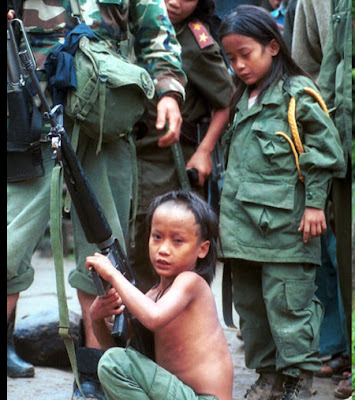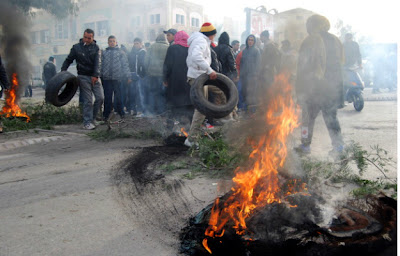A fascinating story on the "God's Army" twins who fought a guerilla war in the jungles of Burma a decade ago. They were children then, and their adult followers attributed magical, super-human powers to the brothers. After a campaign of skirmishes, battles, and hostage-taking, God's Army was disbanded. The twins have been separated for years, one living in Sweden and the other in a refugee camp in Thailand. They were recently reunited and gave an interview to an AP reporter.
This is Karl Rahder's international relations course site. I use this blog for my IR courses at various universities and colleges. It has been neglected for a couple of years, but I am as of late 2016 beginning to add resources to it. News and research sites are listed in the sidebar on the right side of the page - scroll down for the complete list. Info on topics of interest as well as class assignments appear in the main posts.
Sunday, November 3, 2013
Monday, October 28, 2013
"The Dissident's Tookit"
Wow! If you want to read a fresh, empirically-based analysis of what make democratic revolutions succeed, take a look at this just-published piece by Erica Chenoweth in Foreign Policy. She stresses that there is no one strategy for success, and provides real insight into the process.
Here is one of many passages that stand out:
"The results of our research show that opposition campaigns are successful when they manage to do three key things: (1) attract widespread and diverse participation; (2) develop a strategy that allows them to maneuver around repression; and (3) provoke defections, loyalty shifts, or disobedience among regime elites and/or security forces."
Here is one of many passages that stand out:
"The results of our research show that opposition campaigns are successful when they manage to do three key things: (1) attract widespread and diverse participation; (2) develop a strategy that allows them to maneuver around repression; and (3) provoke defections, loyalty shifts, or disobedience among regime elites and/or security forces."
Friday, October 25, 2013
Outstanding piece on the South China Sea
Just extraordinary multi-media piece from the New York Times on the struggle for control of the South China Sea, with a fascinating look into how the Philippines government is coping. Go here...
Monday, September 9, 2013
"Putin's Kiss"
Haven't seen this film yet, but the acclaimed "Putin's Kiss" explores the true story of a Russian woman's embrace of the Nashi youth group and her ultimate realization that she had been manipulated and that Nashi was a malevolent force in Russian politics. The film can be downloaded here.
The Shia-Sunni split
From the Economist, a very brief but useful introduction on the Sunni-Shia schism amongst Muslims.
Wednesday, August 21, 2013
Confidential document surfaces on attitudes and angst inside the Chinese Communist Party
One of the most important articles in years on the attitudes of the highest echelons of the CCP is here in the New York Times. Author Chris Buckley details the contents of "Document No. 9," which blasts “Western constitutional democracy” as well as “universal values” of human rights, Western-inspired notions of "media independence and civic participation," and other insidious ideas creeping into Chinese political discourse.
Wednesday, August 7, 2013
Japan launches something that looks a lot like an aircraft carrier
Honestly, it isn't an aircraft carrier, and the Japanese say it's a "flat-topped destroyer." It can't launch fixed-wing aircraft, although it will carry fourteen helicopters.
Might come in handy for protecting Japan's assets in the South China Sea...
Might come in handy for protecting Japan's assets in the South China Sea...
Monday, July 8, 2013
The Egyptian Economy's Nosedive Since the Revolution
Informative, fascinating piece by Matt Phillips at Quartz on the Egyptian economic mess since Mubarak was overthrown.
Monday, June 17, 2013
Recent information on coltan
The International Consortium of Investigative Journalists has published a number of recent articles on the coltan boom and how the mining and sale of the mineral funds mafia gangs and fuels conflict and environment destruction - not just in Africa, where we would expect, but now in South America.
Go here for their page on "The Illicit Trade of Coltan."
Go here for their page on "The Illicit Trade of Coltan."
Wednesday, June 5, 2013
More on China's (bogus) claims to the South China Sea
Excellent article this week by Mohan Malik at World Affairs on the totally specious claims by China to a huge area in the South China Sea. A must-read if you're interested in the topic.
Sunday, January 27, 2013
Central Asia's water issues - excellent article!
In a piece from Radio Free Europe, Professor Brahama Cellaney discusses water, the emerging nexus of conflict in Central Asia. Lots of great quotes, but I like this one since it sums up the dilemma faced by weak states such as Kyrgyzstan:
And I think given the fact that Uzbekistan is located downstream, but able to assert its political and military supremacy in the region, Tajikistan and Kyrgyzstan find themselves hamstrung. They're not able to embark on projects because the downstream power is unwilling to provide consent, and they're too afraid to embark on projects on their own.
And I think given the fact that Uzbekistan is located downstream, but able to assert its political and military supremacy in the region, Tajikistan and Kyrgyzstan find themselves hamstrung. They're not able to embark on projects because the downstream power is unwilling to provide consent, and they're too afraid to embark on projects on their own.
Monday, January 21, 2013
Thomas Friedman: "Oh, you were taking me literally?"
Thomas Friedman wrote a rather self-serving piece today at Foreign Policy on the flaws in his "petropolitics" thesis. He kinda, sorta acknowledges the lack of empirical support for his argument, but then says of his chief critic, "I would simply note that [he] focuses on the effects of oil prices, which is a literal reading of the "first law.""
Oh. A "literal" reading. Should we have assumed you were being figurative when you stated that your "law" was a causal relationship between oil prices and authoritarianism?
Remember, we said that Friedman's article was an interesting thought piece but shouldn't be taken too seriously. Nice to know that he kinda, sorta agrees.
Oh. A "literal" reading. Should we have assumed you were being figurative when you stated that your "law" was a causal relationship between oil prices and authoritarianism?
Remember, we said that Friedman's article was an interesting thought piece but shouldn't be taken too seriously. Nice to know that he kinda, sorta agrees.
Saturday, January 5, 2013
2012: The Year in Unfreedom
As Foreign Policy author Christian Cayle reminds us in this trenchant post-mortem on the world's fledgling democratic states, "Voting does not a democracy make."
Subscribe to:
Comments (Atom)






